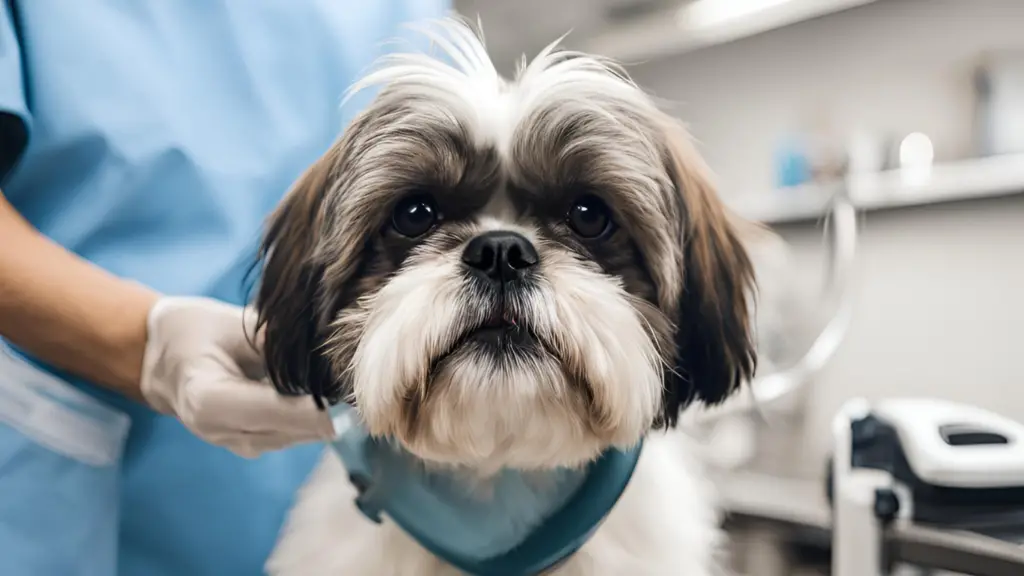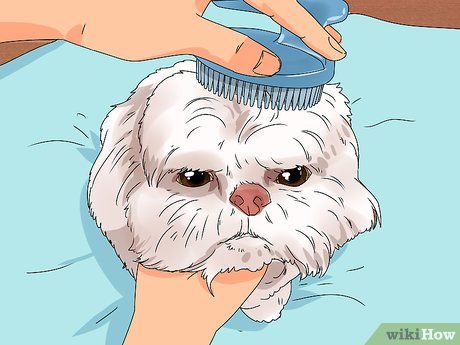
Regular veterinary visits are a cornerstone of maintaining the health and well-being of your Shih Tzu. These visits not only help in early detection of potential health issues but also ensure that your furry friend receives timely vaccinations, preventive care, and necessary treatments. Understanding the significance of regular vet visits and knowing what to expect during these appointments can help you provide the best care for your Shih Tzu. This comprehensive guide will explore the importance of regular vet visits, the typical procedures and tests performed, and how to prepare for and benefit from these visits.
Why Regular Vet Visits Are Crucial for Shih Tzus

Regular vet visits are essential for maintaining your Shih Tzu’s health and ensuring that any potential issues are identified and addressed promptly. These visits contribute to your dog’s overall well-being in several significant ways.
Early Detection of Health Issues
Routine check-ups allow for the early detection of health problems that might not be immediately apparent. During these visits, veterinarians can identify signs of conditions such as dental disease, ear infections, and other common issues specific to Shih Tzus.
- Preventive Health Measures: Early detection enables preventive measures to be taken before conditions worsen. This might include changes in diet, medication, or lifestyle adjustments.
- Monitoring Chronic Conditions: Regular visits are crucial for managing chronic conditions, ensuring that treatments are effective and adjusted as needed.

Vaccinations and Preventive Care
Vaccinations and preventive treatments are integral parts of regular vet visits. They help protect your Shih Tzu from various diseases and parasites.
- Core Vaccinations: Essential vaccinations, such as those for distemper, parvovirus, and rabies, are administered based on your Shih Tzu’s age and health status.
- Parasite Prevention: Regular vet visits allow for the administration of flea, tick, and heartworm preventatives, protecting your Shih Tzu from common parasites.
Highlighting Important Information: Regular vet visits are crucial for early detection of health issues, administering vaccinations, and providing preventive care. They play a key role in maintaining your Shih Tzu’s overall health and well-being.
What to Expect During a Regular Vet Visit

Understanding what happens during a routine vet visit can help you prepare and ensure that your Shih Tzu receives the best care possible. These visits typically involve several key components.
Initial Assessment and History Review
At the start of the visit, the veterinarian will review your Shih Tzu’s medical history and current health status. This includes discussing any concerns or changes in behavior.
- Medical History: The vet will review past medical records, including previous diagnoses, treatments, and vaccinations.
- Behavioral Changes: You’ll be asked about any recent changes in your Shih Tzu’s behavior, eating habits, or physical condition.
Physical Examination

The physical examination is a comprehensive assessment of your Shih Tzu’s overall health. It includes:
- General Appearance: The vet will check your Shih Tzu’s coat, skin, and weight, noting any abnormalities.
- Vital Signs: Vital signs, such as heart rate, respiratory rate, and temperature, will be monitored.
- Body Systems: The vet will examine various body systems, including the eyes, ears, mouth, and abdomen, looking for any signs of illness or abnormalities.
Highlighting Important Information: A regular vet visit includes a thorough review of medical history, a physical examination, and discussions about any concerns or changes in your Shih Tzu’s health. This ensures a comprehensive assessment of their well-being.
Common Tests and Procedures During Vet Visits

Routine vet visits often involve several tests and procedures to assess your Shih Tzu’s health and detect any underlying issues. Understanding these tests can help you prepare for what to expect.
Blood Tests
Blood tests are commonly performed to evaluate various aspects of your Shih Tzu’s health, including organ function and overall well-being.
- Complete Blood Count (CBC): This test measures red and white blood cells, helping to identify anemia, infections, and other conditions.
- Biochemistry Panel: This panel assesses liver and kidney function, as well as electrolyte levels and glucose.
Urinalysis

A urinalysis involves testing your Shih Tzu’s urine to check for signs of urinary tract infections, kidney problems, or diabetes.
- Sample Collection: A urine sample is collected and analyzed for the presence of abnormalities such as blood, glucose, or protein.
- Diagnostic Insights: The results provide valuable insights into your Shih Tzu’s urinary health and overall well-being.
Highlighting Important Information: Blood tests and urinalysis are common procedures during vet visits. They help assess overall health, detect underlying issues, and monitor organ function.
Preparing for Your Shih Tzu’s Vet Visit

Proper preparation can make the vet visit more efficient and less stressful for both you and your Shih Tzu. Consider these tips for a smooth experience.
Gathering Information
Before the visit, gather any relevant information about your Shih Tzu’s health, including:
- Medical Records: Bring any previous medical records, vaccination history, and a list of medications your Shih Tzu is currently taking.
- Behavioral Observations: Note any recent changes in your Shih Tzu’s behavior, appetite, or physical condition to discuss with the vet.
Transport and Comfort

Ensure that your Shih Tzu is comfortable during the trip to the vet:
- Carrier or Leash: Use a secure carrier or leash to transport your Shih Tzu safely to the clinic. Ensure they are comfortable and calm.
- Comfort Items: Bring along familiar items, such as their favorite blanket or toy, to provide comfort during the visit.
Highlighting Important Information: Preparing for a vet visit involves gathering relevant health information, ensuring safe transport, and providing comfort items. This helps reduce stress and ensures a smoother experience for your Shih Tzu.
Addressing Common Concerns During Vet Visits
It’s normal to have concerns or questions about your Shih Tzu’s vet visits. Addressing these concerns can help you feel more confident in managing your pet’s health.

Cost of Veterinary Care
The cost of veterinary care can vary based on the services provided and your location. It’s important to be aware of potential expenses and discuss any concerns with your vet.
- Preventive Care Costs: Regular vaccinations, check-ups, and preventive treatments may have associated costs. Inquire about the cost of these services upfront.
- Payment Options: Many veterinary clinics offer payment plans or financial assistance for more extensive treatments.

Both you and your Shih Tzu may experience stress or anxiety related to vet visits. Managing these feelings can help improve the experience.
- Calm Approach: Remain calm and positive during the visit to help reassure your Shih Tzu.
- Positive Reinforcement: Use treats and praise to reward your Shih Tzu for good behavior during and after the visit.
Highlighting Important Information: Addressing concerns about cost and managing stress can improve your Shih Tzu’s vet visit experience. Discuss expenses upfront and use calming techniques to reduce anxiety.
Follow-Up and Ongoing Care
After the vet visit, follow-up and ongoing care are essential to maintaining your Shih Tzu’s health and addressing any issues identified during the appointment.

Implementing Recommendations
- Treatment Plans: Follow any treatment plans or recommendations provided by the vet, including medication, dietary changes, or additional tests.
- Monitoring Health: Continue to monitor your Shih Tzu’s health and behavior, reporting any changes or concerns to your vet.
Scheduling Future Appointments
Regular follow-up appointments are important for ongoing health monitoring and preventive care.
- Routine Check-Ups: Schedule routine check-ups as recommended by your vet to ensure continued health and well-being.
- Vaccination Updates: Keep track of vaccination schedules and schedule appointments for booster shots or additional vaccines as needed.
Highlighting Important Information: Following up on vet recommendations and scheduling future appointments are crucial for maintaining your Shih Tzu’s health. Regular check-ups and adherence to treatment plans ensure ongoing well-being.
The Benefits of Regular Vet Visits for Shih Tzus

Regular vet visits offer numerous benefits for your Shih Tzu, contributing to their overall health and quality of life.
Improved Health Outcomes
Routine vet visits contribute to early detection and prevention of health issues, leading to improved health outcomes and a longer, healthier life for your Shih Tzu.
- Preventive Care: Early intervention and preventive care help avoid serious health problems and reduce the risk of complications.
- Enhanced Quality of Life: Regular check-ups ensure that any health issues are managed effectively, enhancing your Shih Tzu’s quality of life.
Strengthened Bond with Your Vet

Regular interactions with your vet help build a strong, trusting relationship, which is beneficial for both you and your Shih Tzu.
- Trust and Comfort: Familiarity with the vet and clinic staff helps your Shih Tzu feel more comfortable during visits, reducing stress and anxiety.
- Effective Communication: Regular visits facilitate open communication between you and your vet, ensuring that any concerns or questions are addressed.
Highlighting Important Information: Regular vet visits improve health outcomes, enhance quality of life, and strengthen the bond between your Shih Tzu and their vet. Consistent care ensures a healthier, happier pet.
Conclusion

Regular veterinary visits are a vital component of maintaining your Shih Tzu’s health and well-being. These visits offer opportunities for early detection of health issues, timely vaccinations, and preventive care. Understanding what to expect during vet visits, preparing effectively, and addressing common concerns can help ensure that your Shih Tzu receives the best possible care.
By prioritizing regular vet visits, you contribute to your Shih Tzu’s overall health and quality of life. Implementing recommendations, scheduling follow-up appointments, and maintaining open communication with your vet are essential for ongoing care. With proper attention and care, your Shih Tzu can enjoy a long, healthy, and happy life.


